- Регистрация
- 17 Февраль 2018
- Сообщения
- 25 903
- Лучшие ответы
- 0
- Баллы
- 2 093
Offline
Black Myth: Wukong immediately appealed to my 1980s nostalgia. Fueled by my memories of the TV show Monkey Magic, I naturally jumped at the chance to play the iconic Monkey (in this case Monke) in a game similarly inspired by the classic Chinese tale Journey to the West.
I’m in good company according to the game’s Developer Game Science, which reported initial sales of 10 million downloads in the first three days of its release. That astounding figure even beats sales of FromSoftware’s Elden Ring, which says a lot.
If you haven’t bought the game yet, it’s pure magic — from its fast-paced combat to mad boss fights, there are many hours of staff-splitting fun to be had.
That said, one thing puzzles me: Why on earth are people calling it a Soulslike? Black Myth: Wukong isn’t a Soulslike, even if it does borrow some of FromSoftware’s game mechanics. It is, however, a refreshing new take on an action game that I really want to see more of.
FromSoftware’s brilliant Souls mechanics are diffusing into the broader action category – even into titles that are brave enough to be quite different…
What is a Soulslike game?
Developer FromSoftware’s games have given rise to the genre “Soulslike,” which is testament to how groundbreaking they really are.
I cut my teeth in this genre with Dark Souls, but Elden Ring and Shadow of the Erdtree really refined the experience with their enthralling mix of environments and ghoulish beasts. A whole bunch of other games have followed suit capitalizing on that winning formula, games like Lies of P and Ashen.
What makes these games Soulslike is a complex conflagration of FromSoftware-like gameplay mechanics and design. But to name a few of the hard-to-ignore hallmarks, most have large intricate maps with circular pathways, high difficulty, and gameplay that hinges on the use of stamina bars. Their player combat mechanics lean heavily on dodge-and-roll melee attacks, and they also feature tons of boss fights.
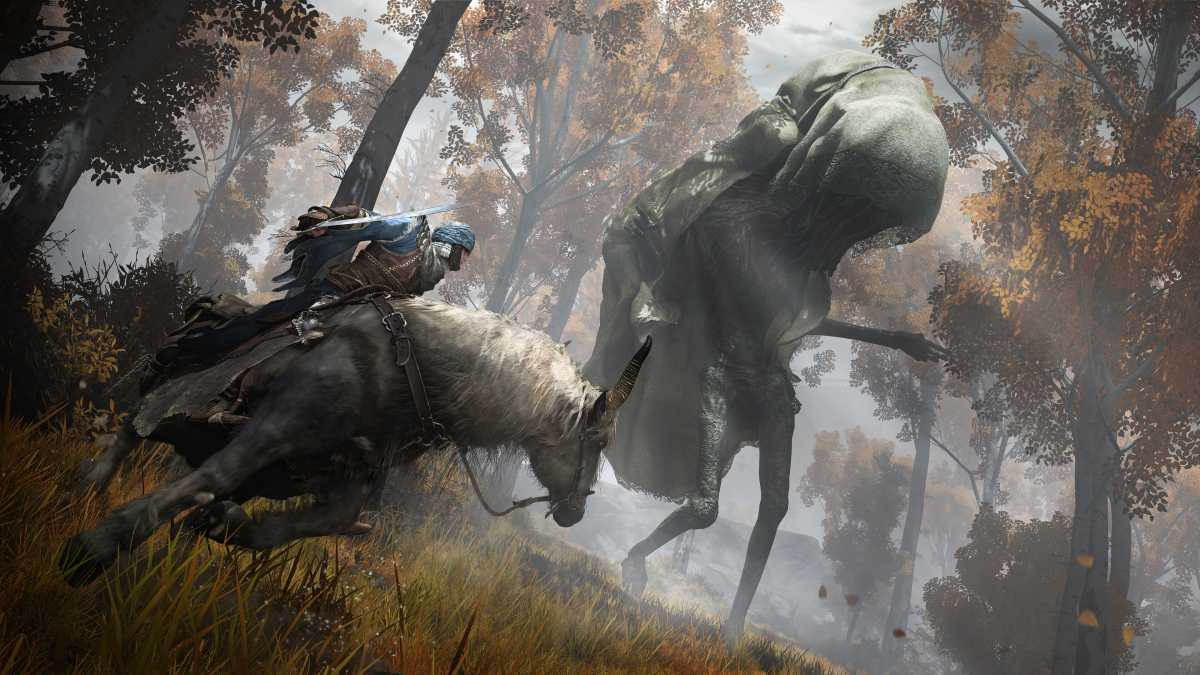
FromSoftware’s Elden Ring is a true Soulslike that’s been lauded as one of the best games of its kind.
FromSoftware’s Elden Ring is a true Soulslike that’s been lauded as one of the best games of its kind.
FromSoftware
FromSoftware’s Elden Ring is a true Soulslike that’s been lauded as one of the best games of its kind.
FromSoftware
FromSoftware
Adding to that list of mechanics, these games have checkpoint systems with player progression hinging on them reaching set locations. Most also have upgradeable items and player abilities and enemies that respawn. Players also get penalized when they die, either losing loot or XP.
Soulslike gameplay, then, revolves around a balance between risk and reward. There’s a lot at stake in venturing out into the world to take on foes, which makes any kind of progression hard but thoroughly satisfying.
Why Black Myth: Wukong isn’t a Soulslike
Black Myth: Wukong doesn’t thumb its nose at all those mechanics. Rather, it incorporates the best parts of each while forging its own path.
That’s refreshing, because it means it appeals to players that love action games but simply don’t like, or are getting a little fatigued with, the sameness of Soulsian mechanics.
But how exactly is the game different?
Take the boss battles, for instance. Like most Soulslike games, bosses are plentiful, and some are as hard as heck to defeat. But while boss attacks in Soulslikes tends to focus on intensity and high damage in hits, bosses in Black Myth: Wukong have smarter combat mechanics and a greater variety of moves. There’s not as much emphasis on cheaply won attacks either.
That keeps gameplay fluid and engaging. It also demands more from you the player. I found myself in deep concentration most of the time, my eyes glued to my screen watching intently for opportunities to deliver my blows — such was the intricacy of battles.
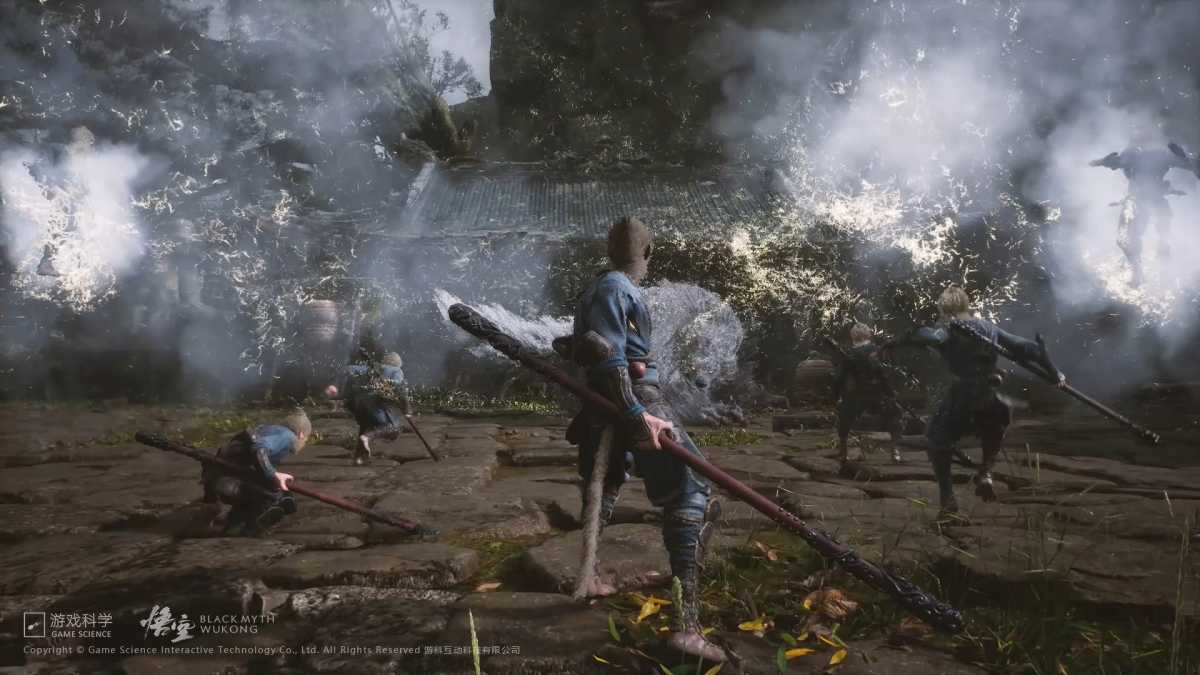
In Black Myth: Wukong combat is intricate.
In Black Myth: Wukong combat is intricate.
Game Science
In Black Myth: Wukong combat is intricate.
Game Science
Game Science
If you invest in developing skills, they won’t go to waste as they can in Shadow of the Erdtree, where you could easily run afoul of cheeky area of effect (AOE) attacks from big bosses. You will last a little longer each attempt, which ultimately is more of a kick when you finally take down bosses like Erlang or Supreme Inspector.
That doesn’t mean combat is easy. Unlike Elden Ring, in Black Myth: Wukong there are more nuances to combat to learn. There’s no block or parry to lean on, for instance. Similarly, button mashing won’t get you very far. There aren’t as many combos as in the Soulslike Star Wars Jedi Survivor, either.
Indeed, rather than just seeming to be cloned from FromSoftware’s master moves archive, like Yaske’s in Assassin’s Creed: Shadows could be — yawn! — Monke’s moves feel new and exciting. To succeed, you must time your attacks and apply special moves.
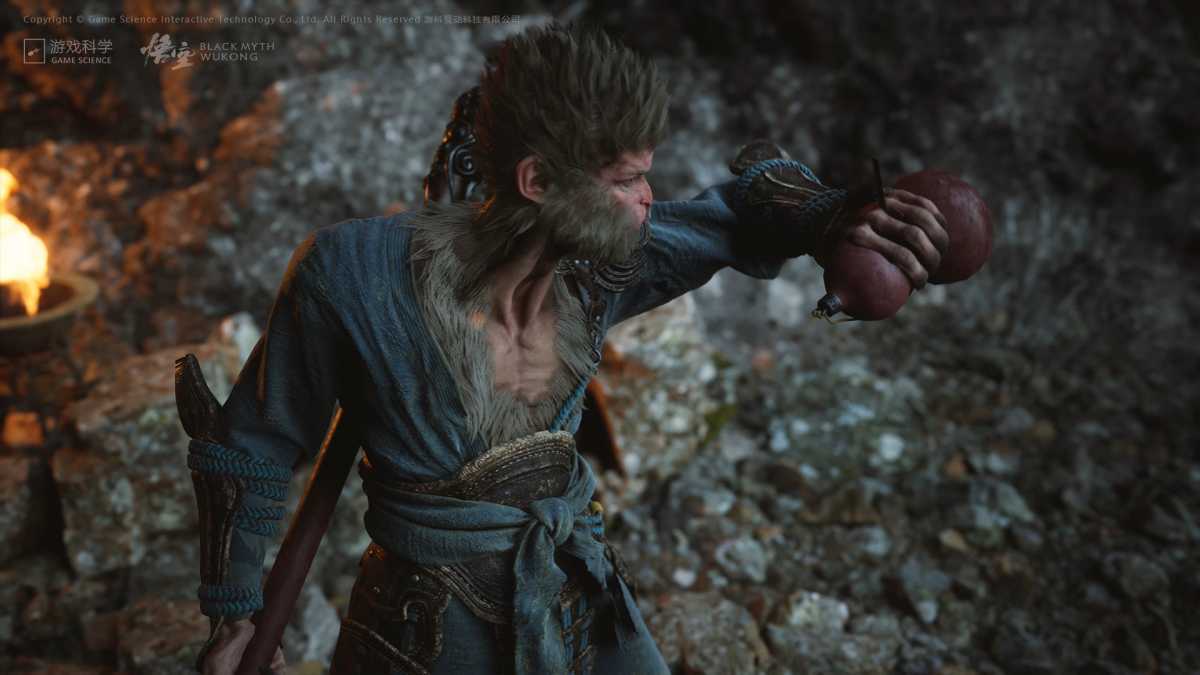
Black Myth: Wukong’s story is inspired by the classic tale Journey to the West.
Black Myth: Wukong’s story is inspired by the classic tale Journey to the West.
Game Science
Black Myth: Wukong’s story is inspired by the classic tale Journey to the West.
Game Science
Game Science
The maps, too, are also completely non-Soulslike, in that they’re not vast open spaces requiring endless exploration. Instead, you must follow a beaten path between bosses. In Black Myth: Wukong linear progression makes complete sense. It syncs nicely with the game’s backstory, one that’s steeped in Chinese mythos and history.
You are, in fact, experiencing an interpretation of an ancient tale that you’re invited to get engrossed in. Journey to the West, written in the 16th Century, is one of the most influential stories in East Asia even today, and so it’s a tale worth knowing. It’s also easier to follow than most Dark Souls games.
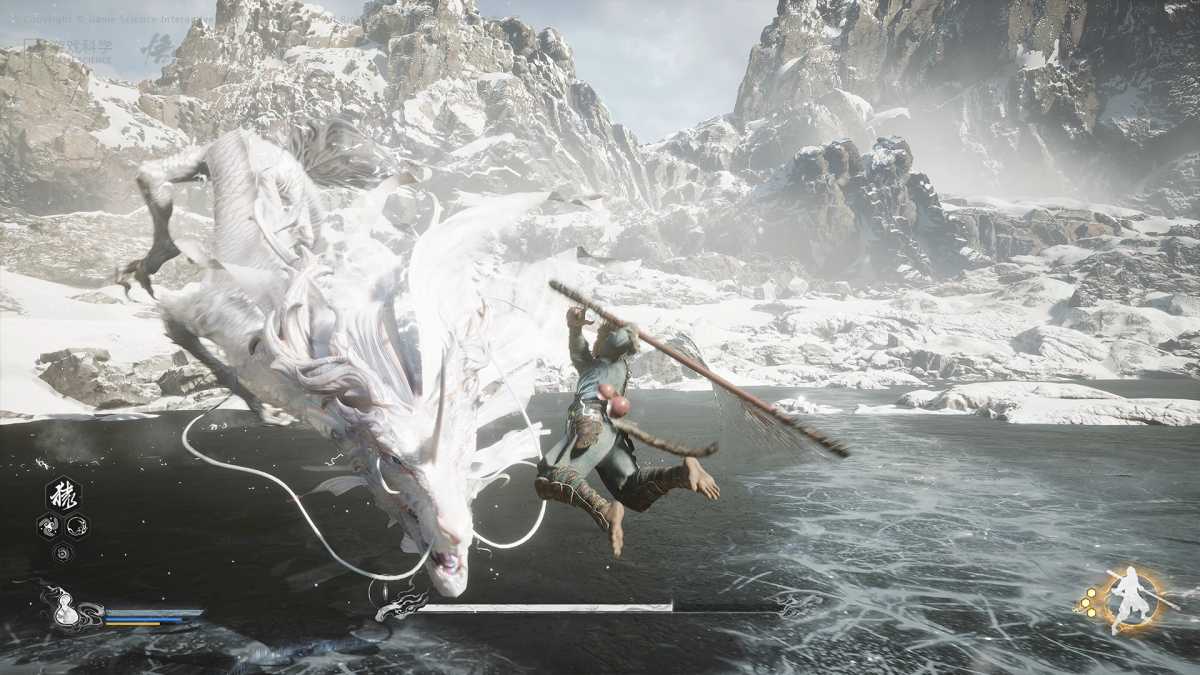
Monke’s moves keep gameplay interesting.
Monke’s moves keep gameplay interesting.
Game Science
Monke’s moves keep gameplay interesting.
Game Science
Game Science
The linear progression also makes comparing and contrasting progress with friends a little easier too. The experience ultimately feels closer to God of War than any Soulslike game I’ve ever played.
Checkpoints do play a part in your player’s progression, but while you could get seriously bogged down in Elden Ring or Dark Soul’s III, in Black Myth: Wukong progression doesn’t feel as stagnant or prone to luck. That’s mostly because there is no penalty for dying.
It’s also due to the fact that your stamina bar is a little more forgiving. , managing stamina is required to pull off moves in combat but after a few upgrades it has a lot less effect than in some Soulsian titles.
, managing stamina is required to pull off moves in combat but after a few upgrades it has a lot less effect than in some Soulsian titles.
One thing I also can’t overlook is the game’s support for Nvidia DLSS Super Resolution and AMD Fidelity FX Super Resolution right out of the box — unlike some janky Souls titles. That may seem trivial to some, but it’s no small thing for us at PCWorld, where we’re forever trying to optimize games for our hardware.
Why a mislabel isn’t helpful
The fact that Black Myth: Wukong has been mislabeled a Soulslike speaks volumes about what’s happening in the action genre right now.
FromSoftware’s brilliant Souls mechanics are diffusing into the broader action category — even into titles that are brave enough to be quite different. While that’s understandable, it’s not helpful to label all of these titles “Soulslike.” Doing so infers that the action genre is somehow static, which is certainly not the case.
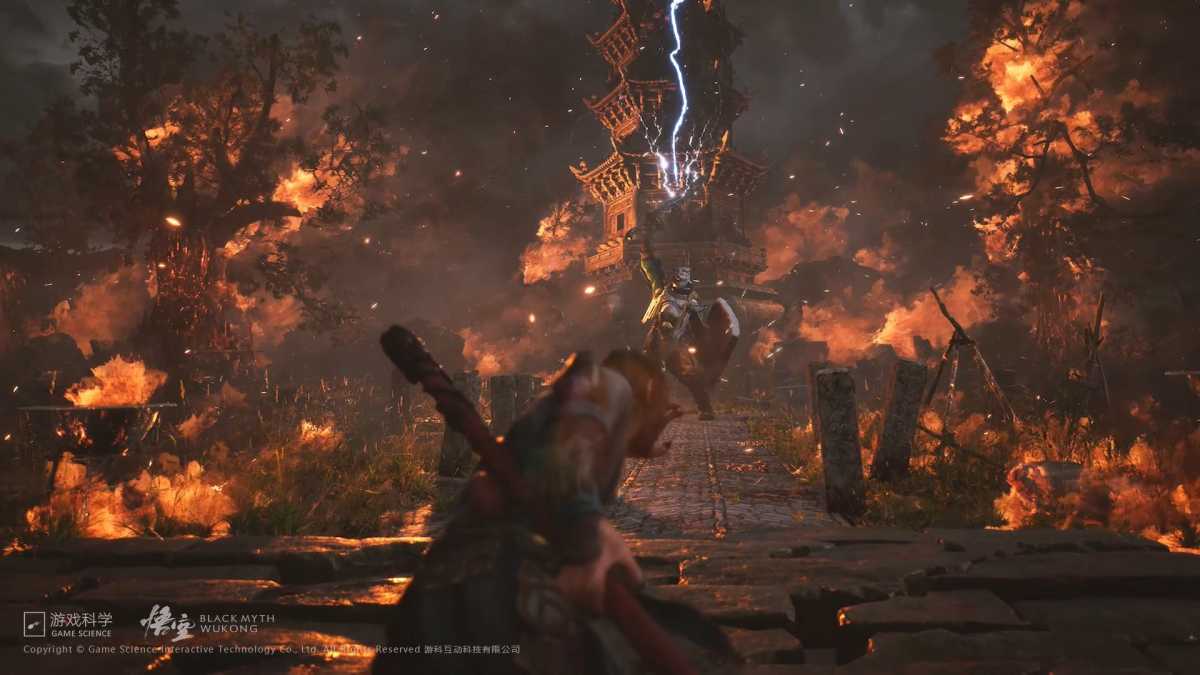
Black Myth: Wukong proves the action game genre is evolving.
Black Myth: Wukong proves the action game genre is evolving.
Game Science
Black Myth: Wukong proves the action game genre is evolving.
Game Science
Game Science
Black Myth: Wukong proves action games are continually evolving — taking the best parts of what’s come before but adding a whole lot of new and exciting mechanics of their own. That’s an encouraging sign.
It’s also testament to Game Science’s development process. The company has obviously put making the best game possible ahead of trying to conform to a formula — one that may have struck a chord in the past, but that some players are getting a little tired of. That’s great news for everyone.
I’m in good company according to the game’s Developer Game Science, which reported initial sales of 10 million downloads in the first three days of its release. That astounding figure even beats sales of FromSoftware’s Elden Ring, which says a lot.
If you haven’t bought the game yet, it’s pure magic — from its fast-paced combat to mad boss fights, there are many hours of staff-splitting fun to be had.
That said, one thing puzzles me: Why on earth are people calling it a Soulslike? Black Myth: Wukong isn’t a Soulslike, even if it does borrow some of FromSoftware’s game mechanics. It is, however, a refreshing new take on an action game that I really want to see more of.
FromSoftware’s brilliant Souls mechanics are diffusing into the broader action category – even into titles that are brave enough to be quite different…
Developer FromSoftware’s games have given rise to the genre “Soulslike,” which is testament to how groundbreaking they really are.
I cut my teeth in this genre with Dark Souls, but Elden Ring and Shadow of the Erdtree really refined the experience with their enthralling mix of environments and ghoulish beasts. A whole bunch of other games have followed suit capitalizing on that winning formula, games like Lies of P and Ashen.
What makes these games Soulslike is a complex conflagration of FromSoftware-like gameplay mechanics and design. But to name a few of the hard-to-ignore hallmarks, most have large intricate maps with circular pathways, high difficulty, and gameplay that hinges on the use of stamina bars. Their player combat mechanics lean heavily on dodge-and-roll melee attacks, and they also feature tons of boss fights.

FromSoftware’s Elden Ring is a true Soulslike that’s been lauded as one of the best games of its kind.
FromSoftware’s Elden Ring is a true Soulslike that’s been lauded as one of the best games of its kind.
FromSoftware
FromSoftware’s Elden Ring is a true Soulslike that’s been lauded as one of the best games of its kind.
FromSoftware
FromSoftware
Adding to that list of mechanics, these games have checkpoint systems with player progression hinging on them reaching set locations. Most also have upgradeable items and player abilities and enemies that respawn. Players also get penalized when they die, either losing loot or XP.
Soulslike gameplay, then, revolves around a balance between risk and reward. There’s a lot at stake in venturing out into the world to take on foes, which makes any kind of progression hard but thoroughly satisfying.
Why Black Myth: Wukong isn’t a Soulslike
Black Myth: Wukong doesn’t thumb its nose at all those mechanics. Rather, it incorporates the best parts of each while forging its own path.
That’s refreshing, because it means it appeals to players that love action games but simply don’t like, or are getting a little fatigued with, the sameness of Soulsian mechanics.
But how exactly is the game different?
Take the boss battles, for instance. Like most Soulslike games, bosses are plentiful, and some are as hard as heck to defeat. But while boss attacks in Soulslikes tends to focus on intensity and high damage in hits, bosses in Black Myth: Wukong have smarter combat mechanics and a greater variety of moves. There’s not as much emphasis on cheaply won attacks either.
That keeps gameplay fluid and engaging. It also demands more from you the player. I found myself in deep concentration most of the time, my eyes glued to my screen watching intently for opportunities to deliver my blows — such was the intricacy of battles.

In Black Myth: Wukong combat is intricate.
In Black Myth: Wukong combat is intricate.
Game Science
In Black Myth: Wukong combat is intricate.
Game Science
Game Science
If you invest in developing skills, they won’t go to waste as they can in Shadow of the Erdtree, where you could easily run afoul of cheeky area of effect (AOE) attacks from big bosses. You will last a little longer each attempt, which ultimately is more of a kick when you finally take down bosses like Erlang or Supreme Inspector.
That doesn’t mean combat is easy. Unlike Elden Ring, in Black Myth: Wukong there are more nuances to combat to learn. There’s no block or parry to lean on, for instance. Similarly, button mashing won’t get you very far. There aren’t as many combos as in the Soulslike Star Wars Jedi Survivor, either.
Indeed, rather than just seeming to be cloned from FromSoftware’s master moves archive, like Yaske’s in Assassin’s Creed: Shadows could be — yawn! — Monke’s moves feel new and exciting. To succeed, you must time your attacks and apply special moves.

Black Myth: Wukong’s story is inspired by the classic tale Journey to the West.
Black Myth: Wukong’s story is inspired by the classic tale Journey to the West.
Game Science
Black Myth: Wukong’s story is inspired by the classic tale Journey to the West.
Game Science
Game Science
The maps, too, are also completely non-Soulslike, in that they’re not vast open spaces requiring endless exploration. Instead, you must follow a beaten path between bosses. In Black Myth: Wukong linear progression makes complete sense. It syncs nicely with the game’s backstory, one that’s steeped in Chinese mythos and history.
You are, in fact, experiencing an interpretation of an ancient tale that you’re invited to get engrossed in. Journey to the West, written in the 16th Century, is one of the most influential stories in East Asia even today, and so it’s a tale worth knowing. It’s also easier to follow than most Dark Souls games.

Monke’s moves keep gameplay interesting.
Monke’s moves keep gameplay interesting.
Game Science
Monke’s moves keep gameplay interesting.
Game Science
Game Science
The linear progression also makes comparing and contrasting progress with friends a little easier too. The experience ultimately feels closer to God of War than any Soulslike game I’ve ever played.
Checkpoints do play a part in your player’s progression, but while you could get seriously bogged down in Elden Ring or Dark Soul’s III, in Black Myth: Wukong progression doesn’t feel as stagnant or prone to luck. That’s mostly because there is no penalty for dying.
It’s also due to the fact that your stamina bar is a little more forgiving.
 , managing stamina is required to pull off moves in combat but after a few upgrades it has a lot less effect than in some Soulsian titles.
, managing stamina is required to pull off moves in combat but after a few upgrades it has a lot less effect than in some Soulsian titles.One thing I also can’t overlook is the game’s support for Nvidia DLSS Super Resolution and AMD Fidelity FX Super Resolution right out of the box — unlike some janky Souls titles. That may seem trivial to some, but it’s no small thing for us at PCWorld, where we’re forever trying to optimize games for our hardware.
Why a mislabel isn’t helpful
The fact that Black Myth: Wukong has been mislabeled a Soulslike speaks volumes about what’s happening in the action genre right now.
FromSoftware’s brilliant Souls mechanics are diffusing into the broader action category — even into titles that are brave enough to be quite different. While that’s understandable, it’s not helpful to label all of these titles “Soulslike.” Doing so infers that the action genre is somehow static, which is certainly not the case.

Black Myth: Wukong proves the action game genre is evolving.
Black Myth: Wukong proves the action game genre is evolving.
Game Science
Black Myth: Wukong proves the action game genre is evolving.
Game Science
Game Science
Black Myth: Wukong proves action games are continually evolving — taking the best parts of what’s come before but adding a whole lot of new and exciting mechanics of their own. That’s an encouraging sign.
It’s also testament to Game Science’s development process. The company has obviously put making the best game possible ahead of trying to conform to a formula — one that may have struck a chord in the past, but that some players are getting a little tired of. That’s great news for everyone.
